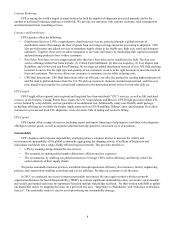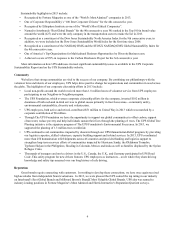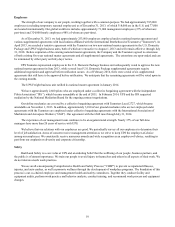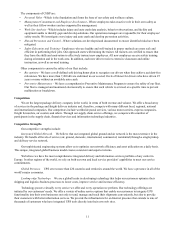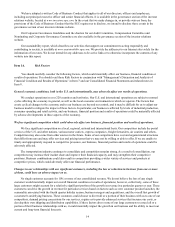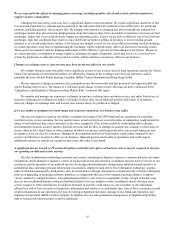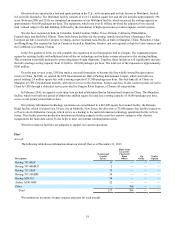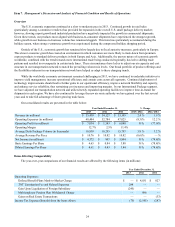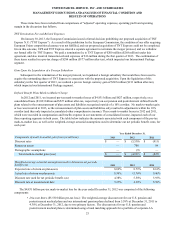UPS 2013 Annual Report Download - page 27
Download and view the complete annual report
Please find page 27 of the 2013 UPS annual report below. You can navigate through the pages in the report by either clicking on the pages listed below, or by using the keyword search tool below to find specific information within the annual report.15
Our business is subject to complex and stringent regulation in the U.S. and internationally.
We are subject to complex and stringent aviation, transportation, environmental, security, labor, employment and other
governmental laws and regulations, both in the U.S. and in the other countries in which we operate. In addition, our business is
impacted by laws and regulations that affect global trade, including tariff and trade policies, export requirements, taxes and
other restrictions and charges. Changes in laws, regulations and the related interpretations may alter the landscape in which we
do business and may affect our costs of doing business. The impact of new laws and regulations cannot be predicted.
Compliance with new laws and regulations may increase our operating costs or require significant capital expenditures. Any
failure to comply with applicable laws or regulations in the U.S. or in any of the countries in which we operate could result in
substantial fines or possible revocation of our authority to conduct our operations, which could adversely affect our financial
performance.
Increased security requirements could impose substantial costs on us and we could be the target of an attack or have a
security breach.
As a result of concerns about global terrorism and homeland security, governments around the world have adopted or may
adopt stricter security requirements that will result in increased operating costs for businesses in the transportation industry.
These requirements may change periodically as a result of regulatory and legislative requirements and in response to evolving
threats. We cannot determine the effect that these new requirements will have on our cost structure or our operating results, and
these rules or other future security requirements may increase our costs of operations and reduce operating efficiencies.
Regardless of our compliance with security requirements or the steps we take to secure our facilities or fleet, we could be the
target of an attack or security breaches could occur, which could adversely affect our operations or our reputation.
We may be affected by global climate change or by legal, regulatory or market responses to such a potential change.
Concern over climate change, including the impact of global warming, has led to significant federal, state and
international legislative and regulatory efforts to limit greenhouse gas (“GHG”) emissions. For example, in the past several
years, the U.S. Congress has considered various bills that would regulate GHG emissions. While these bills have not yet
received sufficient Congressional support for enactment, some form of federal climate change legislation is possible in the
future. Even in the absence of such legislation, the Environmental Protection Agency, spurred by judicial interpretation of the
Clean Air Act, may regulate GHG emissions, especially aircraft or diesel engine emissions, and this could impose substantial
costs on us. These costs include an increase in the cost of the fuel and other energy we purchase and capital costs associated
with updating or replacing our aircraft or vehicles prematurely. Until the timing, scope and extent of any future regulation
becomes known, we cannot predict its effect on our cost structure or our operating results. It is reasonably possible that such
legislation or regulation could impose material costs on us. Moreover, even without such legislation or regulation, increased
awareness and any adverse publicity in the global marketplace about the GHGs emitted by companies in the airline and
transportation industries could harm our reputation and reduce customer demand for our services, especially our air services.
Strikes, work stoppages and slowdowns by our employees could adversely affect our business, financial position and results
of operations.
A significant number of our employees are employed under a national master agreement and various supplemental
agreements with local unions affiliated with the Teamsters. In addition, our airline pilots, airline mechanics, ground mechanics
and certain other employees are employed under other collective bargaining agreements. Strikes, work stoppages and
slowdowns by our employees could adversely affect our ability to meet our customers' needs, and customers may do more
business with competitors if they believe that such actions or threatened actions may adversely affect our ability to provide
services. We may face a permanent loss of customers if we are unable to provide uninterrupted service, and this could adversely
affect our business, financial position and results of operations. The terms of future collective bargaining agreements also may
affect our competitive position and results of operations.





